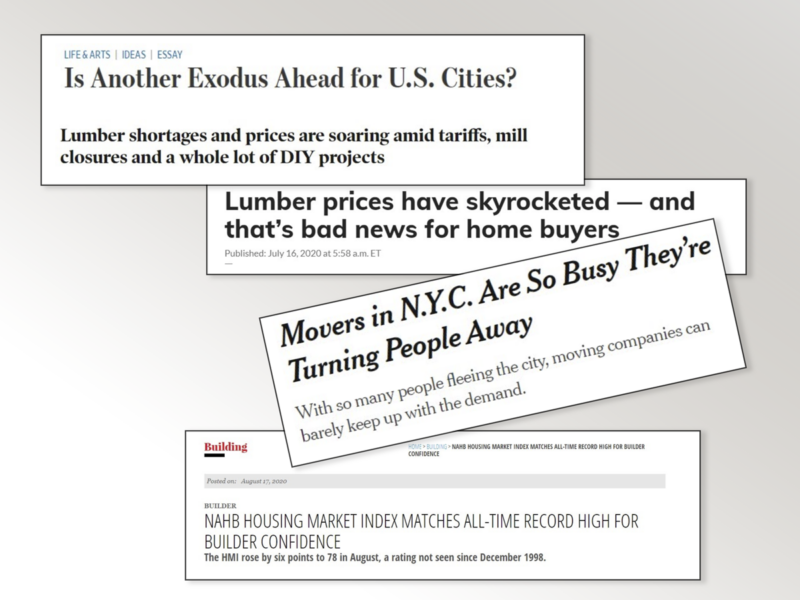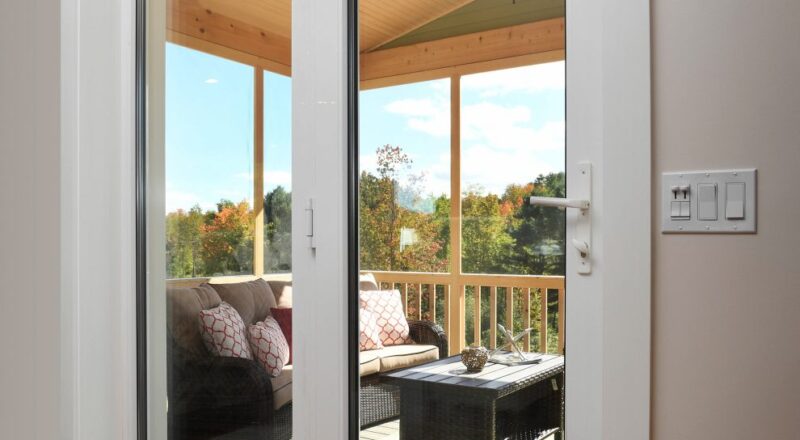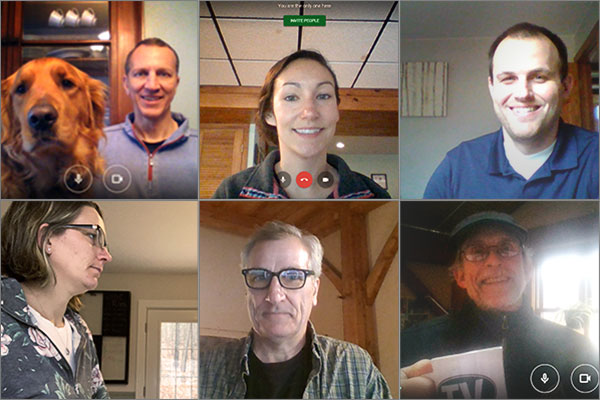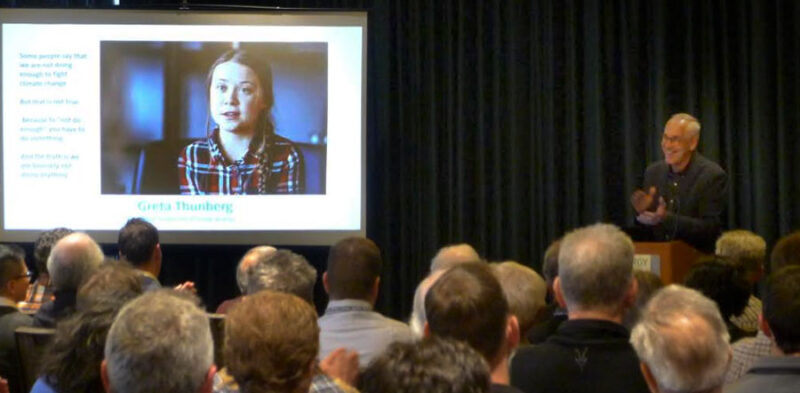Green building is not a stagnant goal, but rather a rapidly-moving evolutionary process. The Northwest EcoBuilding Guild plays an active role in that evolution, working to turn back carbon emissions, become self sustaining, contribute to local economies, and promote health and community. Forward looking, the Guild’s mission is, “Advancing a 200-year perspective on the built environment.”
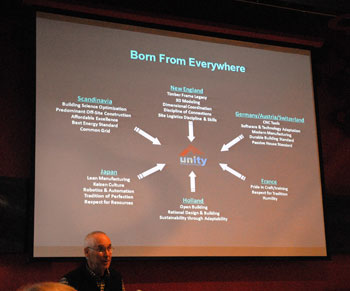
A featured speaker at the Guild’s October 10th conference, Tedd Benson delivered the keynote address: “New House Rules: Achieving 21st Century Sustainable Dwelling.” In the address, Tedd spoke of the paradigm shift and industry overhaul necessary if the carbon neutral goals of the 2030Challenge are to be met.
In the talk, Tedd emphasized that the building industry needs to create a new vocabulary, better work culture, and ever-greater efficiencies. From there, Tedd spoke of how Bensonwood and Unity Homes have been taking on this challenge and leading by example.
At the outset of his talk, Tedd set a hopeful tone by offering a 2012 quote from New York Times columnist, Thomas L. Friedman in his Op Ed piece, Come the Revolution: “Big breakthroughs happen when what is suddenly possible meets what is desperately necessary.” Then, after asking the audience to keep these three phrases in mind, Tedd went on to describe his civil rights activism while a student at Colorado State University in the late 1960s—activism that landed him under the scrutiny of authorities.
Aside from redirecting him towards a career in building, Tedd made two points about his activism in the ’60s. The first concerned the overall moral and civil rights issues that would later connect directly to climate change; the second had to do with society’s tendency for timidity in the face of such challenges. As Tedd would point out later in his talk, with the climate change problem, we all will have to answer the call to action, instead of ignoring it, or even denying it—both responses being all too typical.
After sharing this personal history, Tedd began with Friedman’s last, “desperately necessary” piece first, citing Nobel Prize winner, Mario Molina’s research into the chemicals showing up in our atmosphere that within a year would become a harbinger of the environmental emergency known as global warming.
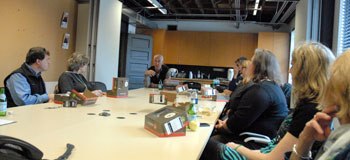
From there, Tedd spoke of the U.N. Intergovernmental Panel of Climate Change’s (IPCC) recent conclusions: That anthropogenic climate disruption (ACD) is fully upon us, and that it is severe, pervasive, and irreversible…unless the equivalent of a wartime response is initiated immediately. Then, framing climate change as essentially a civil rights issue, Tedd quoted Naomi Klein from her book, This Changes Everything: Capitalism vs. the Climate: “In the hot and stormy future we have already made inevitable through our past emissions, an unshakable belief in the equal rights of all people and a capacity for deep compassion will be the only things standing between civilization and barbarism.”
“Compassion means action,” said Tedd, and he pointed out that we already know how to combat climate change: slow the burning of fossil fuels, speed up the development of alternate energy sources, and mandate that we leave 2/3 of the fossil fuel reserves in the ground. Moreover, he pointed out that, according to the Global Commission on the Economy and Climate, as costly as this would be, it would be no more expensive than dealing with the damages caused by doing nothing.
Moving on to the “suddenly possible” piece, Tedd segued to the subject of buildings: specifically, that when it comes to CO2 emissions, buildings are among the biggest culprits in their consumption of fossil fuels and overall contribution to global warming—and how this need not be the case. He pointed out that today, low energy and net zero fossil-fuel-free buildings are no longer epic prototype events, but a reality, so they may represent the lowest hanging fruit in meeting the 2030 Challenge.
Next, in showing how U.S. buildings devolved into their troubled state, Tedd discussed biomimicry and fractals: that vast network of complex adaptive systems that self-select into self-similar patterns at every scale. From the veins of a leaf and the branches of a tree, to the rugged mountains and meandering seashore, to the patterns of our suburban tract homes (from 30,000 feet), complex systems always reveal what they are at their essence: what he calls the “Prime Fractal Rule.” But, as Tedd explained, in contrast to the beauty of fractals in our natural environment, the poor state of our residential built landscape is simply the natural outcome of our (misplaced) values, processes, habits, technology, skills, and social/economic priorities. In his words, “Clearly, the complex adaptive system we call the homebuilding industry has some serious evolving to do.”
More than shelter, Tedd spoke of houses as sacred in our lives and critical to human development. Beyond this, he said that the quality and integrity of our homes are essential underlying and definitive elements of civilization. Then, recalling the recent housing meltdown, he emphasized that homes are not things to be plundered and gamed. We build homes to improve the quality of lives and advance civilization. To drive the point home, Tedd paraphrased Winston Churchill, saying the society we have builds our homes; thereafter, our homes build our society.
Backing up 40 years, Tedd now described his own journey from modern timber frame joinery to high performance building enclosure and systems development— with the help of many associates and expertise from around the world—all while struggling to achieve profitability. In his words, “My optimism was absurdly naïve…I completely misjudged the difficulty and obstacles,” adding, “People often take enormous risks but do not see themselves as risk takers because they operate under the useful delusion that what is being attempted is not risky.”
Tedd described this as the “The Hiding Hand Principle,” a term coined by the late economist, Albert Hirschman. According to Hirschman, “The only way in which we can bring our creative resources fully into play is by misjudging the nature of the task, by presenting it to ourselves as more routine, simple, undemanding of genuine creativity than it will turn out to be.” We are therefore “…more apt to take on and plunge into new endeavors not because we courageously go after big challenges, but because of the erroneously presumed absence of a challenge.”
This theme, woven throughout the speech, becomes the metaphor and hope for the challenges that the building industry faces as it begins to embrace the great breakthroughs in building science: breakthroughs available today that will lead to beautiful, comfortable, healthy, sustainable, and durable living environments while, at the same time, addressing climate change in a serious way.
The Northwest EcoBuilding Guild conference theme, “Building Transformation through Transparency” had three primary goals: 1. to expand the patchwork of green buildings to whole neighborhoods, whole districts and whole communities, 2. to make exceptional green building practices the norm and 3. to ensure that “good building practice” is “green” by definition.
As part of the conference, Tedd participated in the local Green Homes Tour hosted by the Seattle Chapter of the Guild: a bicycling event that combined two of his “greenest” passions: high performance building and biking.
The annual Northwest EcoBuilding Guild conference addresses the needs of the seventh generation, encouraging inclusive discourse with the goal of working to improve the relationship between our communities and our built environment. Learn more about this exciting field by browsing their green building resources, articles, project spotlights and more. See more at: https://www.ecobuilding.org/green-building#sthash.pVSicMhX.dpuf

